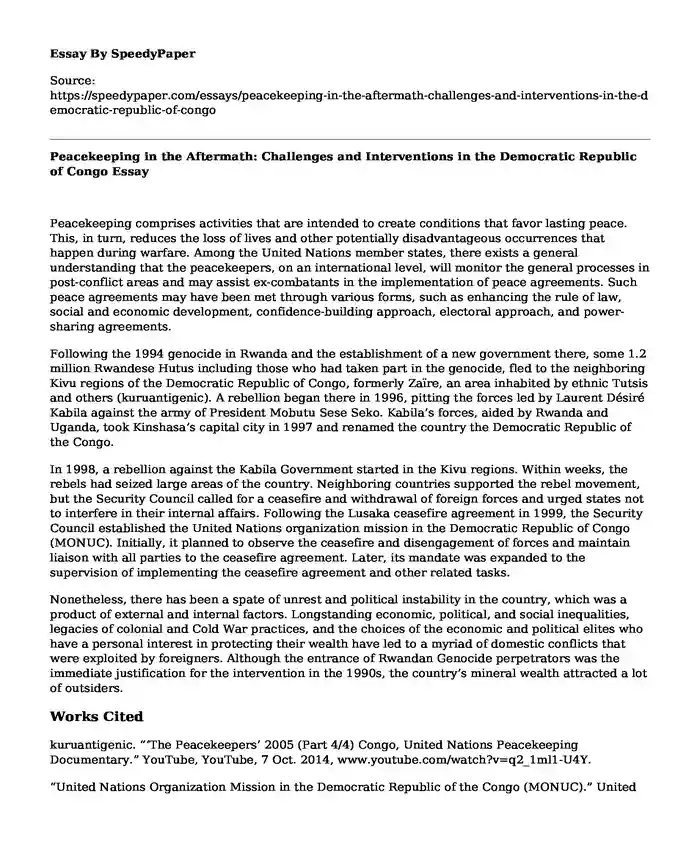
| Type of paper: | Essay |
| Categories: | Politics Economics Government |
| Pages: | 2 |
| Wordcount: | 453 words |
Peacekeeping comprises activities that are intended to create conditions that favor lasting peace. This, in turn, reduces the loss of lives and other potentially disadvantageous occurrences that happen during warfare. Among the United Nations member states, there exists a general understanding that the peacekeepers, on an international level, will monitor the general processes in post-conflict areas and may assist ex-combatants in the implementation of peace agreements. Such peace agreements may have been met through various forms, such as enhancing the rule of law, social and economic development, confidence-building approach, electoral approach, and power-sharing agreements.
Following the 1994 genocide in Rwanda and the establishment of a new government there, some 1.2 million Rwandese Hutus including those who had taken part in the genocide, fled to the neighboring Kivu regions of the Democratic Republic of Congo, formerly Zaïre, an area inhabited by ethnic Tutsis and others (kuruantigenic). A rebellion began there in 1996, pitting the forces led by Laurent Désiré Kabila against the army of President Mobutu Sese Seko. Kabila’s forces, aided by Rwanda and Uganda, took Kinshasa’s capital city in 1997 and renamed the country the Democratic Republic of the Congo.
In 1998, a rebellion against the Kabila Government started in the Kivu regions. Within weeks, the rebels had seized large areas of the country. Neighboring countries supported the rebel movement, but the Security Council called for a ceasefire and withdrawal of foreign forces and urged states not to interfere in their internal affairs. Following the Lusaka ceasefire agreement in 1999, the Security Council established the United Nations organization mission in the Democratic Republic of Congo (MONUC). Initially, it planned to observe the ceasefire and disengagement of forces and maintain liaison with all parties to the ceasefire agreement. Later, its mandate was expanded to the supervision of implementing the ceasefire agreement and other related tasks.
Nonetheless, there has been a spate of unrest and political instability in the country, which was a product of external and internal factors. Longstanding economic, political, and social inequalities, legacies of colonial and Cold War practices, and the choices of the economic and political elites who have a personal interest in protecting their wealth have led to a myriad of domestic conflicts that were exploited by foreigners. Although the entrance of Rwandan Genocide perpetrators was the immediate justification for the intervention in the 1990s, the country’s mineral wealth attracted a lot of outsiders.
Works Cited
kuruantigenic. “‘The Peacekeepers’ 2005 (Part 4/4) Congo, United Nations Peacekeeping Documentary.” YouTube, YouTube, 7 Oct. 2014, www.youtube.com/watch?v=q2_1ml1-U4Y.
“United Nations Organization Mission in the Democratic Republic of the Congo (MONUC).” United Nations, United Nations, 2010, peacekeeping.un.org/mission/past/monuc/.
Cite this page
Peacekeeping in the Aftermath: Challenges and Interventions in the Democratic Republic of Congo. (2024, Jan 22). Retrieved from https://speedypaper.com/essays/peacekeeping-in-the-aftermath-challenges-and-interventions-in-the-democratic-republic-of-congo
Request Removal
If you are the original author of this essay and no longer wish to have it published on the SpeedyPaper website, please click below to request its removal:
- Loose Change Final Cut - Free Essay with a Documentary Analysis
- Traditional Gender Roles, Essay Samples
- Essay Example on Politics of Respectability
- Essay Example. Rights and Responsibilities of Citizens
- Cultural Competence. Free Paper
- Free Essay Example - Causes of Racial Injustice
- Free Paper Sample on Organizational Information
Popular categories




